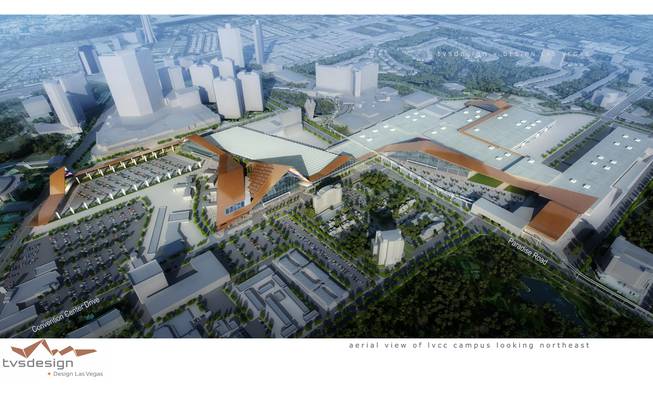
Courtesy
A rendering of the Las Vegas Convention Center expansion proposal by TVS Design/Design Las Vegas.
Tuesday, Nov. 14, 2017 | 3:16 p.m.
Related Coverage
The Las Vegas Convention and Visitors Authority board on Tuesday chose an architect for the Las Vegas Convention Center expansion, reviewed tourism’s effect on jobs and addressed the financing of sports events and the implications of a proposed federal tax bill.
The board agreed with the Las Vegas Convention Center District Committee which earlier this month recommended that TVS Design/Design Las Vegas should be awarded the contract to design the 1.4 million-square-foot expansion of the Las Vegas Convention Center.
The expansion is the second phase of an overall $1.5 billion revamp of the entire facility, which began with the purchase and demolition of the Riviera and will end with a remodel of the existing facility.
The board also heard a presentation by Jeremy Aguero, of the economics firm Applied Analysis, about the economic effects tourism has on the job market in Southern Nevada. Tourism has been instrumental, he said, in raising employment levels in the wake of the recession.
Since the recession, employment in the Las Vegas Valley has fully recovered and totals 983,500 jobs, Aguero said. That’s nearly 50,000 more jobs than the pre-recession high of 936,800 in May 2007, he said.
“In the past 12 months, employment in Southern Nevada increased by 23,400 positions, or 2.4 percent, representing the 79th consecutive month of year-over-year growth,” Aguero said.
Aguero noted that Southern Nevada's shortage of construction workers. “This will be a problem for the community because the area is 10,000-12,000 construction employees short for the projects that are in the development pipeline,” he said.
The board also discussed finances, reviewing the LVCVA’s annual report, and addressed how to fund the marketing of larger sporting events that could be hosted in Las Vegas once the new stadium for the Raiders is built.
In a recent meeting of the Las Vegas Stadium Authority Raiders President Marc Badain said the team is working to bring the Super Bowl, NFL draft and FIFA World Cup to Las Vegas.
The LVCVA may have to create a special account to collect funds to pay for the city’s efforts to market these large sporting events, said Rana Lacer, chief financial officer of the LVCVA.
“We do have a sports marketing department already,” Lacer said. “We support things like NASCAR and the NHL.”
Las Vegas has been so successful in attracting professional sports, she said, that it should start planning now to set aside the money needed to market larger events such as the Super Bowl or the World Cup.
“In a lot of states, the state itself has funds that support these special events like the Super Bowl,” she said. “But in Nevada, that’s not how it works.”
Lacer said she’ll likely have a sports marketing fund proposal for the board to consider next spring for the 2019 fiscal budget.
In addition, Lacer told the board that her department is investigating the potential impact of the proposed Republican tax bill on using tax-exempt public bonds to finance public projects.
The bill would limit the use of tax-exempt bonds — originally intended to help governments finance public works — to pay for stadiums for teams owned by wealthy people and companies.
However, Lacer said, the bill’s language inadvertently captured convention facilities that sometimes host smaller professional sports events.
“It’s a small nuance to the language,” she said. “It says stadiums and professional arenas, but that’s determined based on a five-year look-back on whether the facility has hosted professional sports. Well, we have had pro wrestling here, we have had table tennis championships here.”
The LVCVA uses bonds to pay for projects such as the expansion and renovation of the Las Vegas Convention Center.
If the bill passed, Lacer said, the LVCVA would have figure out what things can be still be paid for using tax-exempt bonds as opposed to cash. The accounting, she said, would become very complicated.
It’s hard at this point to calculate how much the bill could cost the LVCVA, she said. The language could be changed or even dropped altogether. In fact, she said, the Senate version of the tax bill doesn’t even include the bond language.
Still, Lacer said, her from-the-hip projections tell her the cost to the LVCVA could be “upward of $8 million to $10 million.”
